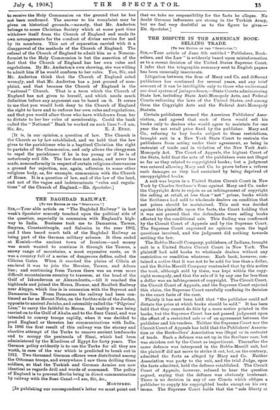THE BAGHDAD RAILWAY.
LTO THE EDITOR or TER " SPECTATOR:1 SIR,--Arollr able article on "The Baghdad Railway" in last week's Spectator scarcely touched upon the political aide of the question, especially in connexion with England's high- way to India. Business took me to Damascus, Tarsus, Smyrna, Constantinople, and Salonica in the year 1902, and I then heard much talk of the Baghdad Railway as being part of the German military scheme. It then ended at Konieh—the ancient town of Iconium—and money was much wanted to continue it through the Taurus, a snowy range of mountains, a most expensive route, as it was a country full of a series of dangerous defiles, called the Cilician Gates. When it reached the plains of Cilicia at sea-level it was to join the Mersine, Tarsus, and Adana line; and continuing from Tarsus there was an even more difficult mountainous country to traverse, at the head of the Gulf of Iskanderoon or Alexandretta,—till it reached the highlands and joined the Horne, Hamar, and Baalbek Railway near Aleppo, which line is in connexion with the Beyrout and Damascus line. From Damascus the railway had been con- tinued as far as Mount Nebo, on the further side of the Jordan, opposite to ancient Jericho, and ostensibly called the "Pilgrims' Line," to carry the faithful to Mecca. In reality it was being carried on to the Gulf of Akaba and to the Suez Canal, and was intended to convey troops rapidly, when it was decided to prod England or threaten her communications with India. In 1906 the first result of this railway was the stormy and abortive attempt of the Turks to remove ancient landmarks and to occupy the peninsula of Sinai, which had been administered by the Khedives of Egypt for forty years. The German policy evidently is to use the Turks for all they are worth, in ease of the war which is predicted to break out in 1912. Two thousand German officers were distributed among the Ottoman troops, and everywhere I saw them drilling these soldiers, so that the Turkish and German Armies are now identical as regards drill and words of command. The policy of England is to prevent Berlin being in direct communication by railway with the Suez Canal.—I am, Sir, &c.,
MONTISED.
[In publishing our correspondent's letter we must point out
that we take no responsibility for the facts he alleges. No doubt German influences are strong in the Turkish Army, but we feel very doubtful as to the figure he gives. ED. Spectator.]


















































 Previous page
Previous page